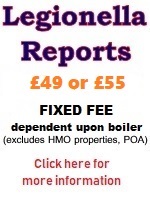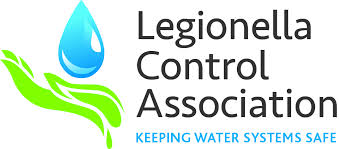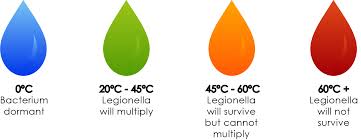
|
||||||
|
||||||
Legionella Risk Assessments for LandlordsTelephone 01509 268141 to arrange your Legionella Risk Assessment or have your questions answered |
||||||
 
This short Briefing is provided and produced by "The Legionella Specialist" which is a Legionella Risk Assessment company. It lays out the requirements on private landlords with reference to the avoidance of Legionnaires' Disease (caused by the Legionella bacteria). 
A number of consultants and letting agents appear to have mistaken guidance from the Health and Safety Executive (HSE) for new legislation requiring landlords of private rented property to seek Legionella testing certificates. Testing for Legionella should not be confused with temperature monitoring which is a reliable method for confirming the water system is under control. Nor should it be confused with a Legionella Risk Assessment Report. Health & Safety Law does NOT recognise or require Landlords to obtain and produce a "Legionella Test Certificate". Testing or sampling (sometimes referred to as microbiological monitoring) is not usually required for domestic hot and cold water systems unless a Risk Assessors Report highlights the property's assessment rating at a level that poses a serious risk to health. Landlords have a duty to ensure that their properties are free from health and safety hazards. This includes, inter alia, carrying out a risk assessment to assess for conditions that can encourage the spread of Legionella and subsequently mitigating or controlling such conditions. Provided an adequate knowledge of the property's water system and what to look for and sample in terms of the Legionella bacteria, there is no reason why a landlord cannot conduct this assessment themselves. Specific guidance on Legionella and the legal responsibilities of landlords can be found on the Health and Safety Executive website: legionella and landlords' responsibilities. 
The Statutory Dutyholder, being the person in control of the premises to be assessed has the sole responsibility for compliance with relevant Health & Safety Regulations (including avoidance of, or reducing any relevant risk as may be present to exposure to Legionella bacteria).
"The Legionella Specialist" is a Risk Assessment Service Provider Company having been trained and accredited by Elmhurst Energy Systems Ltd. Assessors Accreditation Certificate No. EES/002756. Our instructions can be obtained directly from the Landlord/Dutyholder or from any of the Dutyholders' Appointed Representatives. Our initial Risk Assessment Report is specific and our charge is for a single visit. Ongoing actions of any recommendations and follow-up re-visits by ourselves remain the responsibility of the Dutyholder to organise, or any of their appointed representatives. Landlords/Dutyholders and any of the Dutyholders' Appointed Representatives would benefit from our Professional Indemnity and Public Liability Insurance cover to ensure our Reports are fully protected and compliant against any legal action relating to Legionella control. This is currently set and covered by our Accreditation company at £5 million per claim. 
Legionnaires' DiseaseLandlords of residential accommodation have a responsibility to take measures to ensure that their properties are free from health and safety hazards, (27) this includes taking measures to combat Legionnaires' Disease. Duties under the Health and Safety at Work etc. Act 1974, the Management of Health and Safety at Work Regulations 1999 and the Control of Substances Hazardous to Health Regulations 2002 provide a framework designed to assess, prevent or control the risk from bacteria like Legionella and take suitable precautions to protect against it. (28) The Health and Safety Executive (HSE) explains landlords' duties in relation to the Health and Safety at Work etc. Act 1974: 
Section 3(2) of the Health and Safety at Work Act 1974 Detailed information on the approved code of practice and guidance from the HSE can be found at the following link: Legionnaires' disease. The control of legionella bacteria in water systems. What Is Legionnaires' Disease?Legionnaires' Disease is a pneumonia like illness caused by the Legionella bacteria, which can be fatal. Infection is caused by inhalation of droplets of water carrying the bacteria, which leads to infection. It is non-contagious. The bacteria are found in the natural environment and are able to contaminate, grow and thrive in water systems if conditions are not carefully controlled to prevent their proliferation. Bacteria will multiply daily if taps, showers and other outlets are not regularly used. The bacteria can double in number every 12 hours in optimum conditions. Dangerously high levels of the bacteria could be reached in as little as 10 days. (30) 
Who Is At Risk?Everyone is susceptible to infection. However, some people are at a higher risk, including:-

In November 2013, 284 confirmed cases of Legionnaire’s Disease were reported in the UK. Landlords' Responsibilities
Landlords are under a legal duty of care to ensure that the risk of exposure to Legionella for tenants, residents and visitors to their properties is adequately assessed and controlled. Specifically, landlords are obligated to have a risk assessment conducted on their properties followed by subsequent periodic reviews. Provided that the property is low risk (which includes most residential settings including houses or flats with small domestic type water systems where the turnover is high) there is no reason why the landlord should not carry out the risk assessment themselves, provided that they are adequately knowledgeable about the water system in the property. It is advisable for landlords to familiarise themselves with the following HSE publications:

Legionella FAQs »
(27) For more information see Library Briefing Paper 01917, The Housing Health and Safety Rating System (HHSRS) |
||||||
|
© 2019 Nottinghamshire Energy Assessors and EPC Providers Derbyshire EPCs - Leicestershire EPCs - Privacy |
||||||